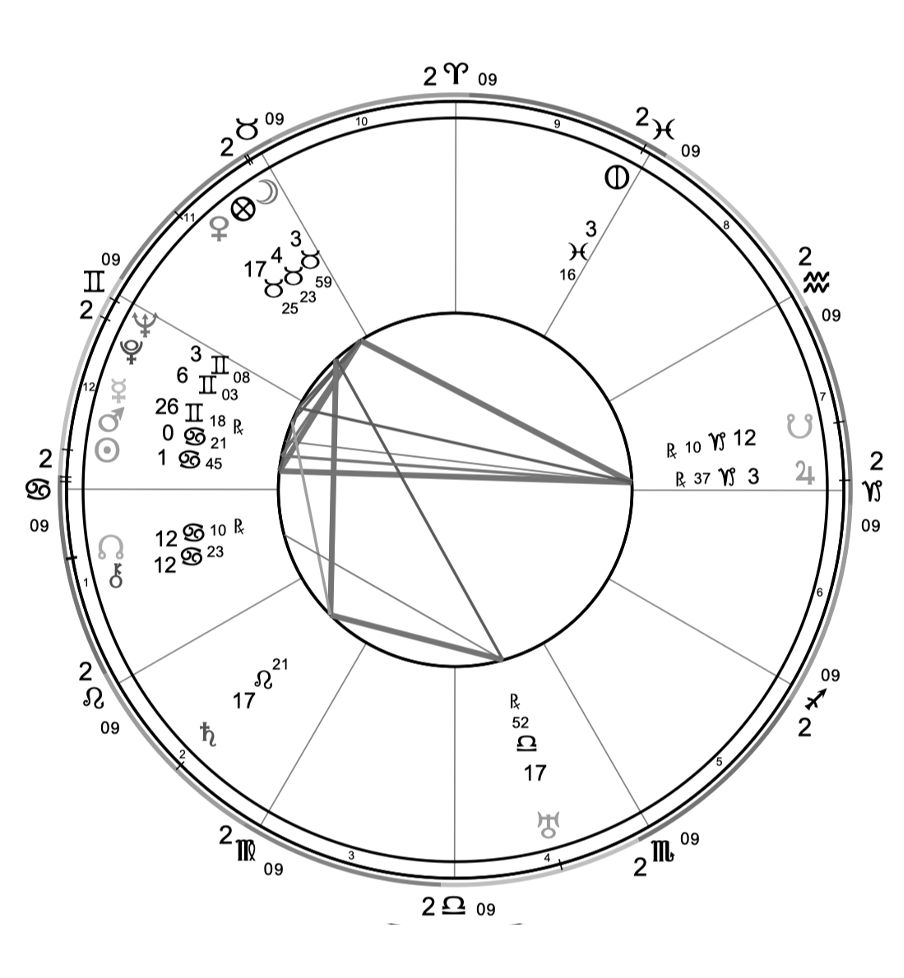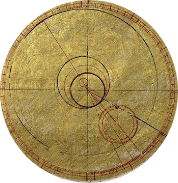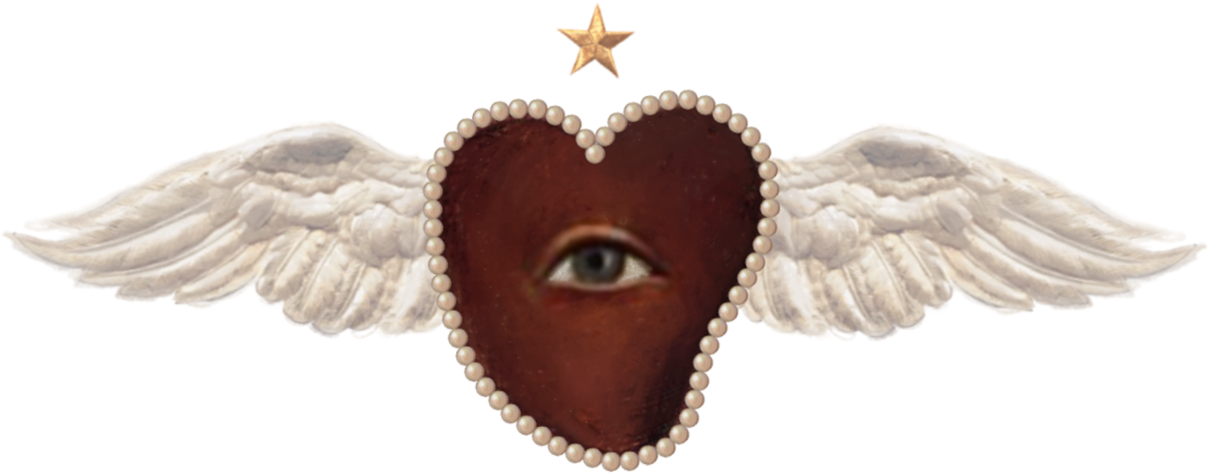The poet lets us feel or imagine from every possible angle something that eludes countless others, something so mysterious that it is known only by heart.
Stellar Wheel

cancer



Anna Akhmatova
Narrated by Isabelle Laydier Kristensen, co-founder of a wondrous realm known as @blumenhausmagazine, a gathering place for beauty makers. Isabelle's beautiful heart gave this story the most precious gift of all—her voice.
10 minute read
Whispers of the Moon: A Poetic
The poet lets us feel or imagine from every possible angle something that eludes countless others, something so mysterious that it is known only by heart.
Whether embodied in a poem, novel, lyric, or rhyme, poetry is the "magic potion made from roots"—an alchemical process that brings into clearer focus the universal moments where we encounter each other, to meet, to love, to share.
Anna Akhmatova's poetry, in particular, speaks of these universal experiences in a straightforward fashion, making us feel connected and understood. Her life, like a flickering flame, was steadfastly recorded in the poetry she crafted. Each verse—naked and clothed, collective and personal embodies an absolute calm of the euphoria process.
Akhmatova accepted her whole life as fate, as something preordained from above.
There was not one part of herself she was willing to extinguish, not even her shadow. The shadow served her as the friend she craved, a faithful companion in a world of internal exile. In her own words:
Her mystical guardian, the shadow, taught her two invaluable lessons: first, greet tenderness and don't argue with life; second, there is no right or wrong way to do things as long as one seeks the guidance of the Spirit in the quest for the experience of the Mystery. With her friend by her side, Anna penetrated toward origin, toward what is most ancient, and accessed her poetic memory, which she trusted implicitly.
“Rising from the past, my shadow is running in silence to meet me.”
To better understand Akhmatova’s life, let's unravel the cosmic ballet of astrological elements that shaped her existence. Anna Andreevna Gorenko was born in 1889 in a village near Odesa, Ukraine, beneath the splendid constellation of Cancer 1 2. The cognomen “Akhmatova” was borrowed as a nom de plume from her Tartar grandmother.
In a world where poetry is a sensation and an art of genuineness, the archetype of Cancer comes to life.
Cancer is the mistress of the spiritual ritual. She understands that ritual is something we surrender to and allow 'it' to unfold us rather than something we do or control. Her influence, like a captivating spell, weaves through the fabric of reality, cloaking the world in an aura of magic and wonder.
Cancer's expansive and contractile nature is ruled by the silvery orb—the Moon. Under cover of darkness and with the utmost secrecy, the Moon caries out nature's most occult work: formation and fertilization of seed. In these uncharted realms of the unknown, delicate seeds—like fragile beginnings—take root in the depths of obscurity. They germinate quietly in the darkness, not yet ready to face the radiance of the Sun.
As she grew older, it became evident that she had a deep sense of intuition and a remarkable ability to foresee future events. She considered herself clairvoyant, and many of her contemporaries acknowledged her gift of prophecy and marveled at her uncanny predictions 4.
From the beginning, she was attracted to writing poems. Unsurprisingly, her Lunar intuition told her, in a voice of cogency beyond contradiction. With her pen as a sword and her heart as a shield, Akhmatova was well-armed to receive every impulse, multiply it, and transform it into action.
Whenever a poem would start to come to her, she would let her imagination freely dictate it.
These intuitive processes aligned seamlessly with her identity as a Cancerian who welcomes the universe's profound impressions to come to her like a gentle, cosmic embrace.
Although she did everything expected of a well-mannered young woman, displaying proper manners and etiquette and conversing in French, inside, she harbored a fierce storm within, like a dormant volcano on the verge of eruption 5. Tirelessly reaching out her claws and ceaselessly moving up, down, and sideways, Akhmatova dared to will, dared to act, but above all, she dared to be silent. In her words:
"I defend not my voice, but my silence."

She was married three times and had several lovers here and there 6. Out of her marriage to the prominent poet Nikolay Gumilyov came her only child, a son, Lev. Together with Gumilyov and a group of like-minded young artists, she founded a movement, Acmeism, that sought to replace the heavy symbolist poetry of the late 19th and early 20th century with a more simpler and clearer language.
In one of her poems, Akhmatova addresses her lover, Amedeo Modigliani, employing a line that reads, "When you're drunk it's so much fun, Your stories don't make sense." This verse reveals her acmeist inclinations.
Additionally, she writes, "You dreamt of me, I knew, and hence I couldn't sleep," further exemplifying her mastery over the movement's principle.
One doesn't necessarily need to be a poet or a mystic to articulate such real and clear phrases. Anyone can indeed speak these words as they appear seemingly ordinary. However, when a poet of Akhmatova's caliber recites or pens them down, they exude a powerful, energetic charge that sets them apart from the words of others.
Akhmatova's work is truly an unusually organized and beautiful piece of writing. Take, for instance, her poem “Requiem.”
It is like a portal to another dimension,
a jump right into the timeline between 1935 and 1940 where a single line of poetry—the wrong line of poetry—would be reason enough to face a firing squad.
"These were the years of great terror when each person thought, tomorrow, maybe it'll be me.
It was a time when only the dead smiled, happy in their peace".
These experiences inspired her to write:
“In the storehouse of my memory are Your words, your smiles and gestures.”
“You and I
are like grief and the mountain.
We will not meet in this world.
But sometimes you will send across the stars. A sign?”
Amidst the raging Revolution, Akhmatova mourned the loss and suffering of her friends and family, who were either executed or exiled. The “inquisition” had already carried off her former husband, son, and closest friends.
Her third husband was also imprisoned and sent to a Siberian camp, where he died. This was just the beginning of a long ordeal during which the circle of arrests grew wider and wider.
For Anna, the imaginative pressure seemed higher during the periods of frustration. The sense of doom fed her all-consuming artistic drive, and this is evident in her verse: "The moon sees a woman laying at home, her son is in jail, her husband is dead, say a prayer for her instead." She has saved herself more than once by returning to poetry:
"Madness with its wings
Has covered half my soul
It feeds me fiery wine
And lures me into the abyss."
Requiem IX To Death 1940
Resilient yet emotionally drained, Akhmatova spent seventeen long months waiting in queues outside the prison to give a loaf of bread to her son. The never-ending lines mainly consisted of women, "their lips blue with cold," waiting to deliver sustenance for their innocent husbands and sons.
In the eyes of those who waited with her under the prison, Akhmatova saw "a mother's anguish multiplied by millions." We can almost picture their weary faces, etched with the lines of agony and strength, as they stood in solidarity under the shadow of their shared adversity.
As the years passed and the revolution reshaped the fabric of society, Akhmatova's ability to endure, adapt, and rebuild in the face of such devastation can be seen as nothing short of a superpower 11 12. In this context, she says:
"I have a lot of work to do today;
I need to slaughter memory,
Turn my living soul to stone
Then teach myself to live again
But how…"
"Requiem" VII The Verdict 1939
The enigmatic word "how" is a profound mystery. As the word gracefully escapes the confines of the poem, it is free at last, like a bird breaking free from its cage. The art of conveying intricate ideas through simplistic language is truly a skill. Akhmatova demonstrates precisely that as she liberates her subject matter, setting it free to unfold.
Akhmatova was denied publication for much of her career
but persevered through the hardships of war, extreme hunger, and the loss of her loved ones. Her poetry, which had been so personal and private, underwent a sudden and dramatic transformation, becoming the voice of the entire people 13.
In her youth, Akhmatova embraced an elegant and bohemian lifestyle, finding joy in aesthetic and sensual pleasures, appearing somewhat aloof and detached from matters relating to human pain or the significance of life.
However, the post-war era saw a remarkable transformation in her. She writes:
"I've learned to live simply, wisely,
To look at the sky and pray to God…
And if you were to knock at my door,
it seems to me I wouldn't even hear".
Rising from the ashes, Akhmatova emerged with a profound sense of self-awareness as a poet, embodying a newfound depth and empathy that transcended the frivolity of her earlier years.
This transformation propelled a compelling shift in her artistic perspective: she not only wrote poetry but reconfigured the poetic landscape itself, dramatically altering the norms and traditions set by her predecessors, including Pushkin, Boratynsky, and Annensky.
While some of her works fell victim to the ravages of time, a significant portion survived, bearing testimony to her bravery and determination. Like a ghostly hand, these surviving works reach out from the pages toward the readers, perpetuating the enduring influence of Akhmatova's poetry.
- end -
I hope Akhmatova's story has stirred your kind-ly, compassionate, nurturing instincts. Perhaps it has evoked a desire in you to wrap her in a protective embrace, like a fragile child in need of love, comfort, and reassurance. Nevertheless, thank you for visiting me in this space and immersing yourself in Akhmatova's tale.
Akhmatova, A (Anderson, N. K) 2004 'The Word That Causes Death's Defeat: Poems of Memory,' US: Yale University Press.
Akhmatova, A. (McNaughton W. & Mayhew L.) 1989 'Poem Without a Hero & Selected Poems.' US: Oberlin College Press.
Anna Akhmatova 1889—1966 https://www.poetryfoundation.org/poets/anna-akhmatova
Reeder, R., 1995 'Anna Akhmatova: Poet and Prophet,' US: St Martins Press.
Marie Anne Lenormand's cartomancy cards and the corresponding illustrations.
Francis Picabia Hyper Poésie
Anna’s 12th house contains an ethereal convergence of the Sun, Mars, Mercury, Pluto, and Neptune. Within this celestial combination, one could envision faithful meetings, sudden separations, moments of sensuality, morse melancholy, and amorous poetry. Here, the realism of feelings spares neither the author nor the topic they are writing about.
Anna's chart shows the Moon-Venus-Part of Fortune conjunction. This indicates clairvoyance—the ability to see beyond the present—which undoubtedly influenced her life and poetry, giving them depth and a sense of inevitability that is rare in literature.
Uranus's positioning in Libra within the 4th astrological house paints a vivid picture of an unconventional upbringing with pagan undertones. In Akhmatova's words,
"I earned the nickname "Wild Girl" because I went barefoot, did not wear a hat, etc., because I jumped from a boat into the open sea and swam during storms, and because I was in the sun so much my skin peeled. All these things shocked the provincial nobility."
She sensed these cosmic ties had much to contribute to her ongoing purpose and journey through the 3D realm. Each encounter carried a narrative of unfinished business, profoundly influencing the challenges and joys she encountered. Within these connections, she found her true self and stirred the depths of her artistic spirit into a dance of creation.
Note: Akhmatova was known to be highly intuitive and psychic. Vivid premonitions and spot-on insights into people and situations would frequently visit her.
In Akhmatova's chart, Mercury dances in the arms of Gemini. Mercury in Gemini, for a poet, is not just a placement; it's a profound connection. The poet becomes so entwined with the word, so much so that the word seems to encapsulate its very essence. It's as if the word and the poet are inseparable. For Mercury in Gemini, poetry is not futile. It is a monstrous undertaking. It supplies the poet with his most precious possession - the language.
Take Carl Jung, who had a Chiron in Aries in the 1st house. Instead of being hindered by his conflicts with colleagues, particularly with Freud, he used this conflict to pioneer a new understanding of the psyche based on "archetypal" exploration of his own inner world. Also, with Chiron in Taurus in the 1st house, Isadora Duncan revolutionized dance with her sensual “wave” motions and earthy movements, leaving a sweet mark on the world of performing arts. And, who was the person who said, "I am the greatest"? Muhammad Ali. He must have had a Chiron in Leo in the 1st house. Let me check. Yesssss! Indeed, he did. Perfect celestial charm befitting his larger-than-life persona.
In Akhmatova's chart, Pluto in Gemini, Saturn in Leo, and Uranus in Libra engage in a spirited dialogue. I can almost hear them saying:
Pluto: "In the depths of your silence, transformation awaits."
Saturn: "You must embrace your potential; excuses are shadows that hinder your path."
Then, like a sudden gust of wind, Uranus burst into the room: "Why tread the same path when the universe is a playground?"
Together, they paved the way for Akhmatova's growth. This applies to all realms—physical, mental, emotional, spiritual, and even other timelines.
"I am in the middle of it: chaos and poetry.
Poetry and love and, again complete chaos.
Pain, disorder, occasional clarity.
And at the bottom of it all: only love; poetry.
Sheer enchantment, fear, humiliation.
It all comes with love."
(The Akhmatova Journals, Volume I: 1938 – 1941)













































